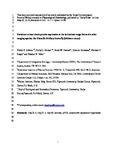Variation in heat shock protein expression at the latitudinal range limits of a widely-distributed species, the Glanville fritillary butterfly ( Melitaea cinxia )
| dc.contributor.author | Advani, NK | |
| dc.contributor.author | Kenkel, CD | |
| dc.contributor.author | Davies, SW | |
| dc.contributor.author | Parmesan, Camille | |
| dc.contributor.author | Singer, Michael | |
| dc.contributor.author | Matz, MV | |
| dc.date.accessioned | 2016-07-09T18:30:33Z | |
| dc.date.available | 2016-07-09T18:30:33Z | |
| dc.date.issued | 2016-05-20 | |
| dc.identifier.issn | 0307-6962 | |
| dc.identifier.issn | 1365-3032 | |
| dc.identifier.uri | http://hdl.handle.net/10026.1/5037 | |
| dc.description.abstract |
Studies of heat shock response show a correlation with local climate, although this is more often across altitudinal than latitudinal gradients. In the present study, differences in constitutive but not inducible components of heat shock response are detected among populations of the Glanville fritillary butterfly Melitaea cinxia L. that exist at the species' latitudinal range limits (Finland and Spain). The study demonstrates that macroclimatic differences between these sites should cause greater exposure of the Spanish population to higher temperatures. Thermal stress treatments are used to estimate differences in the expression of four genes potentially relevant for tolerating these temperatures. For the analysis, three heat-shock proteins and glyceraldehyde-3-phosphate dehydrogenase (G3PDH), a glycolysis enzyme that also modulates cell growth based on metabolic state, are chosen. Two constitutive differences are found between the sites. First, insects from Spain have higher levels of Hsp 21.4 than those from Finland regardless of thermal stress treatment; this protein is not inducible. Second, insects from Finland have higher levels of G3PDH. The two remaining Hsps, Hsp20.4 and Hsp90, show dramatic up-regulation at higher temperatures, although there are no significant differences between insects from the different populations in either constitutive levels or inducibility. In nature, differences between the study populations likely occur in the expression of all four genes that were studied, although these differences would be directly climate-induced in Hsp20.4 and Hsp90 and constitutive in Hsp21.4 and G3PDH. Inducibility may mitigate the need for constitutive variation in traits that adapt insects to local climate. | |
| dc.format.extent | 241-248 | |
| dc.format.medium | Undetermined | |
| dc.language | en | |
| dc.language.iso | en | |
| dc.publisher | Wiley | |
| dc.subject | Climate change adaptation | |
| dc.subject | constitutive adjustment hypothesis | |
| dc.subject | Glanville fritillary butterfly | |
| dc.subject | glyceraldehyde-3-phosphate dehydrogenase | |
| dc.subject | heat shock protein | |
| dc.subject | Hsp20.4 | |
| dc.subject | Hsp21.4 | |
| dc.subject | Hsp90 | |
| dc.subject | latitude | |
| dc.subject | qPCR | |
| dc.title | Variation in heat shock protein expression at the latitudinal range limits of a widely-distributed species, the Glanville fritillary butterfly ( Melitaea cinxia ) | |
| dc.type | journal-article | |
| dc.type | Journal Article | |
| plymouth.author-url | https://www.webofscience.com/api/gateway?GWVersion=2&SrcApp=PARTNER_APP&SrcAuth=LinksAMR&KeyUT=WOS:000386940600008&DestLinkType=FullRecord&DestApp=ALL_WOS&UsrCustomerID=11bb513d99f797142bcfeffcc58ea008 | |
| plymouth.issue | 3 | |
| plymouth.volume | 41 | |
| plymouth.publication-status | Published | |
| plymouth.journal | Physiological Entomology | |
| dc.identifier.doi | 10.1111/phen.12148 | |
| plymouth.organisational-group | /Plymouth | |
| plymouth.organisational-group | /Plymouth/Faculty of Science and Engineering | |
| plymouth.organisational-group | /Plymouth/REF 2021 Researchers by UoA | |
| plymouth.organisational-group | /Plymouth/REF 2021 Researchers by UoA/UoA07 Earth Systems and Environmental Sciences | |
| dcterms.dateAccepted | 2016-04-15 | |
| dc.rights.embargodate | 2017-5-20 | |
| dc.identifier.eissn | 1365-3032 | |
| dc.rights.embargoperiod | 12 months | |
| rioxxterms.versionofrecord | 10.1111/phen.12148 | |
| rioxxterms.licenseref.uri | http://www.rioxx.net/licenses/under-embargo-all-rights-reserved | |
| rioxxterms.licenseref.startdate | 2016-05-20 | |
| rioxxterms.type | Journal Article/Review |


